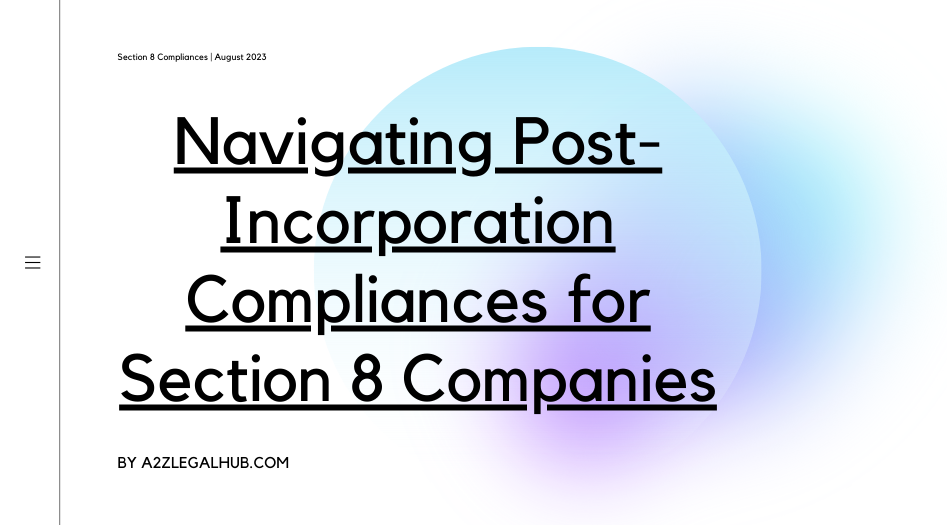Introduction:
Following the successful incorporation of your Section 8 company, a nonprofit entity dedicated to charitable endeavors, it’s imperative to understand and adhere to the crucial compliances that shape its lawful operations. This comprehensive guide delves into the essential post-incorporation compliances for Section 8 companies, offering insights into regulatory requirements and strategies to ensure your organization’s continued compliance.
1. Conducting the Annual General Meeting (AGM) and Financial Reporting:
A fundamental obligation for Section 8 companies is to hold an Annual General Meeting (AGM) within six months of the fiscal year’s closure. During this meeting, members review and sanction financial statements encompassing the balance sheet, income statement, and cash flow statement. Transparent financial reporting showcases prudent fund management and ethical utilization of resources.
2. Submission of Income Tax Returns:
Similar to other entities, Section 8 companies must file their income tax returns. Employ Form ITR-7, tailored for nonprofit organizations, to accurately report all revenue streams, including donations and grants. Avail the applicable tax exemptions to optimize your tax liability while upholding regulatory compliance.
3. Maintenance of Accurate Books of Accounts:
Adhering to the legal requirement, Section 8 companies must diligently maintain meticulous books of accounts. These records meticulously document all financial transactions, grants received, donations, and expenditures. Utilize professional accounting services or software to ensure the accuracy and legality of your financial records.
4. Prompt Reporting of Changes to Regulatory Authorities:
Any modifications to the registered office address, board members, or key personnel necessitate immediate reporting to the relevant regulatory bodies. Timely updates guarantee that your organization’s records are current and enable effective communication with regulatory authorities.
5. Diligent Fund Utilization:
Central to the Section 8 company ethos is the scrupulous application of funds for charitable pursuits. Maintain a distinct bank account to manage your organization’s financial transactions and safeguard against any inadvertent misdirection of funds.
6. Adherence to the Foreign Contribution Regulation Act (FCRA):
If your Section 8 company receives foreign contributions or donations, compliance with the Foreign Contribution Regulation Act (FCRA) is paramount. Registration under FCRA is obligatory for transparently receiving and employing foreign contributions in line with your organization’s objectives.
7. Safeguarding Section 8 Status:
Section 8 companies are established with the noble intent of advancing philanthropic causes. Preserving their status hinges on unwavering alignment with the organization’s outlined objectives. Regularly assess your initiatives to ensure they harmonize with your stated mission.
Conclusion:
Establishing a Section 8 company marks the initiation of a journey dedicated to fostering positive societal impact. Upholding post-incorporation compliances, as detailed in this guide, is essential for maintaining the integrity of your organization. By orchestrating AGMs, submitting accurate financial statements, and complying with regulatory mandates, your Section 8 company can thrive in its charitable undertakings while upholding legal standards. Always remember that adherence to compliance not only enhances your organization’s credibility but empowers you to drive meaningful transformations within the communities you serve.

